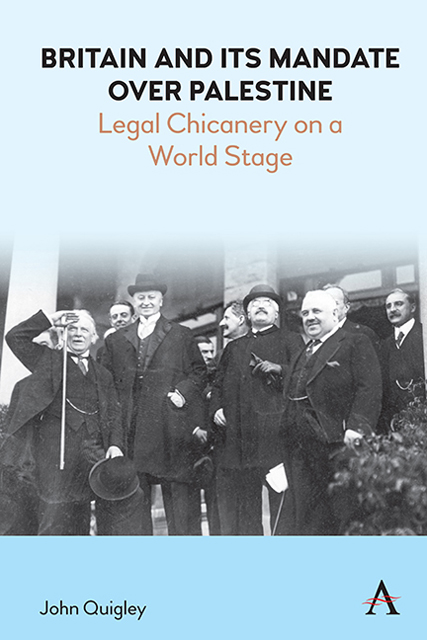Book contents
- Frontmatter
- Contents
- Preface
- Setting the Stage: Was Britain’s Rule in Palestine Legal?
- 1 The Balfour Declaration Is the Focal Point for the Legal Situation of Palestine
- 2 The Balfour Declaration Was a Binding Commitment to the Jewish People
- 3 The Jewish National Home Meant a Jewish State
- 4 The Balfour Declaration Was Issued to Affirm Jewish Rights in Palestine
- 5 The Paris Peace Conference Raised Jewish Statehood to the International Level
- 6 Britain’s Allies Made the Balfour Declaration an International Commitment
- 7 Britain’s Allies Endorsed Jewish Rights
- 8 Britain Took on Palestine Because of the League’s Mandate System
- 9 The League of Nations Protected Palestine’s Arab Population
- 10 Britain Was Given Palestine by the League of Nations
- 11 The League of Nations Put the Palestine Mandate into Legal Force
- 12 The Peace Treaty with Turkey Legalized Britain’s Status in Palestine
- 13 The Palestine Mandate Document Was a Treaty between Britain and the League
- 14 The League of Nations Required Britain to Implement the Balfour Declaration
- 15 The Palestine Mandate Document Implemented the League Covenant
- 16 The Palestine Mandate Document Recognized Jews as a National Group
- 17 The Palestine Mandate Document Bound Britain to the Balfour Declaration
- 18 The International Community Committed Itself to the Balfour Declaration
- 19 Britain Held Legal Status in Palestine
- 20 The United Nations Charter Carried Forward a Jewish Entitlement to Statehood
- Postscript: Why History Matters
- Documents Annex
- Notes
- Bibliography
- Index
14 - The League of Nations Required Britain to Implement the Balfour Declaration
Published online by Cambridge University Press: 10 January 2023
- Frontmatter
- Contents
- Preface
- Setting the Stage: Was Britain’s Rule in Palestine Legal?
- 1 The Balfour Declaration Is the Focal Point for the Legal Situation of Palestine
- 2 The Balfour Declaration Was a Binding Commitment to the Jewish People
- 3 The Jewish National Home Meant a Jewish State
- 4 The Balfour Declaration Was Issued to Affirm Jewish Rights in Palestine
- 5 The Paris Peace Conference Raised Jewish Statehood to the International Level
- 6 Britain’s Allies Made the Balfour Declaration an International Commitment
- 7 Britain’s Allies Endorsed Jewish Rights
- 8 Britain Took on Palestine Because of the League’s Mandate System
- 9 The League of Nations Protected Palestine’s Arab Population
- 10 Britain Was Given Palestine by the League of Nations
- 11 The League of Nations Put the Palestine Mandate into Legal Force
- 12 The Peace Treaty with Turkey Legalized Britain’s Status in Palestine
- 13 The Palestine Mandate Document Was a Treaty between Britain and the League
- 14 The League of Nations Required Britain to Implement the Balfour Declaration
- 15 The Palestine Mandate Document Implemented the League Covenant
- 16 The Palestine Mandate Document Recognized Jews as a National Group
- 17 The Palestine Mandate Document Bound Britain to the Balfour Declaration
- 18 The International Community Committed Itself to the Balfour Declaration
- 19 Britain Held Legal Status in Palestine
- 20 The United Nations Charter Carried Forward a Jewish Entitlement to Statehood
- Postscript: Why History Matters
- Documents Annex
- Notes
- Bibliography
- Index
Summary
A key element of the Narrative is that a legal obligation to implement the Jewish national home was imposed on Britain by the League of Nations. The American lawyer Felix Frankfurter, who, as we shall shortly see, helped draft the Palestine mandate document, wrote, “The Mandate explicitly recited the Balfour Declaration and charged the mandatory with putting it into effect.”
Even international law writers who denounce Britain for overriding Arab rights concede the point. Jean Allain, for example, in a book that castigates Britain roundly, wrote that as a result of “the willingness of the allied Powers to include the [Balfour] Declaration in the British mandate for Palestine,” the Balfour Declaration rose “from a political pledge to a legal obligation.”
The same view was expressed by the Special Committee on Palestine, whose report, as we have seen, was key to the UN General Assembly recommending Jewish statehood. In Chapter 6, we saw the Special Committee's statement, “On 25 April 1920, the Supreme Council of the Allied Powers agreed to assign the Mandate for Palestine to Great Britain on the understanding that the Balfour Declaration would be put into effect.” The Special Committee immediately followed that statement, saying, “The draft mandate was confirmed by the Council of the League of Nations on 24 July 1922, and entered into force formally on 29 September 1923.” In that fashion the Special Committee suggested that a requirement imposed on Britain by the Principal Allied Powers was imposed on it by the League Council as well. However, the League Council never discussed the Balfour Declaration. It did approve, in the conditional fashion we saw, the mandate document that incorporated the Balfour Declaration, but it was never given the opportunity to say what it thought about the Balfour Declaration. And of course, as we saw, Britain never gained the legal status required for a mandate to be lawful.
The idea that Britain was required to implement the Balfour Declaration was espoused in 2015 at the Hebrew University symposium on the Palestine mandate. “The 1922 Mandate for Palestine—a binding resolution of the Council of the League of Nations—required Great Britain to implement the terms of the 1917 Balfour Declaration,” wrote Yuval Shany, a professor of law at the University.
- Type
- Chapter
- Information
- Britain and its Mandate over PalestineLegal Chicanery on a World Stage, pp. 105 - 110Publisher: Anthem PressPrint publication year: 2022

